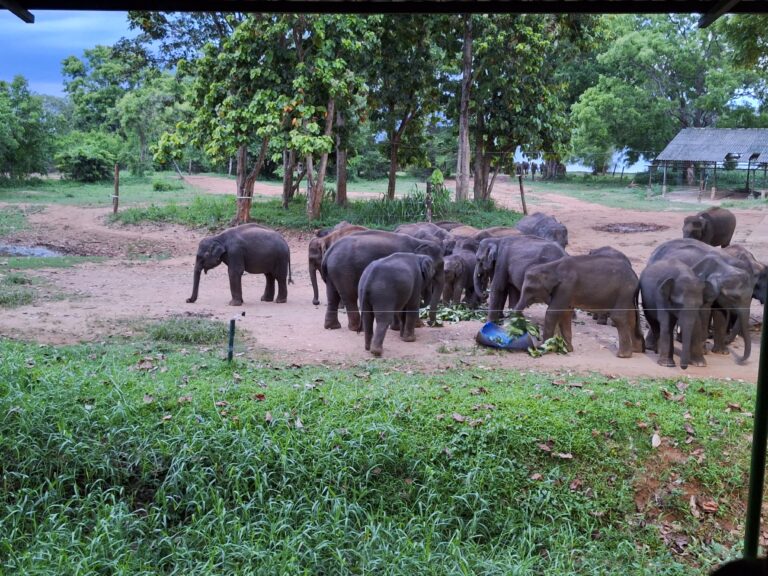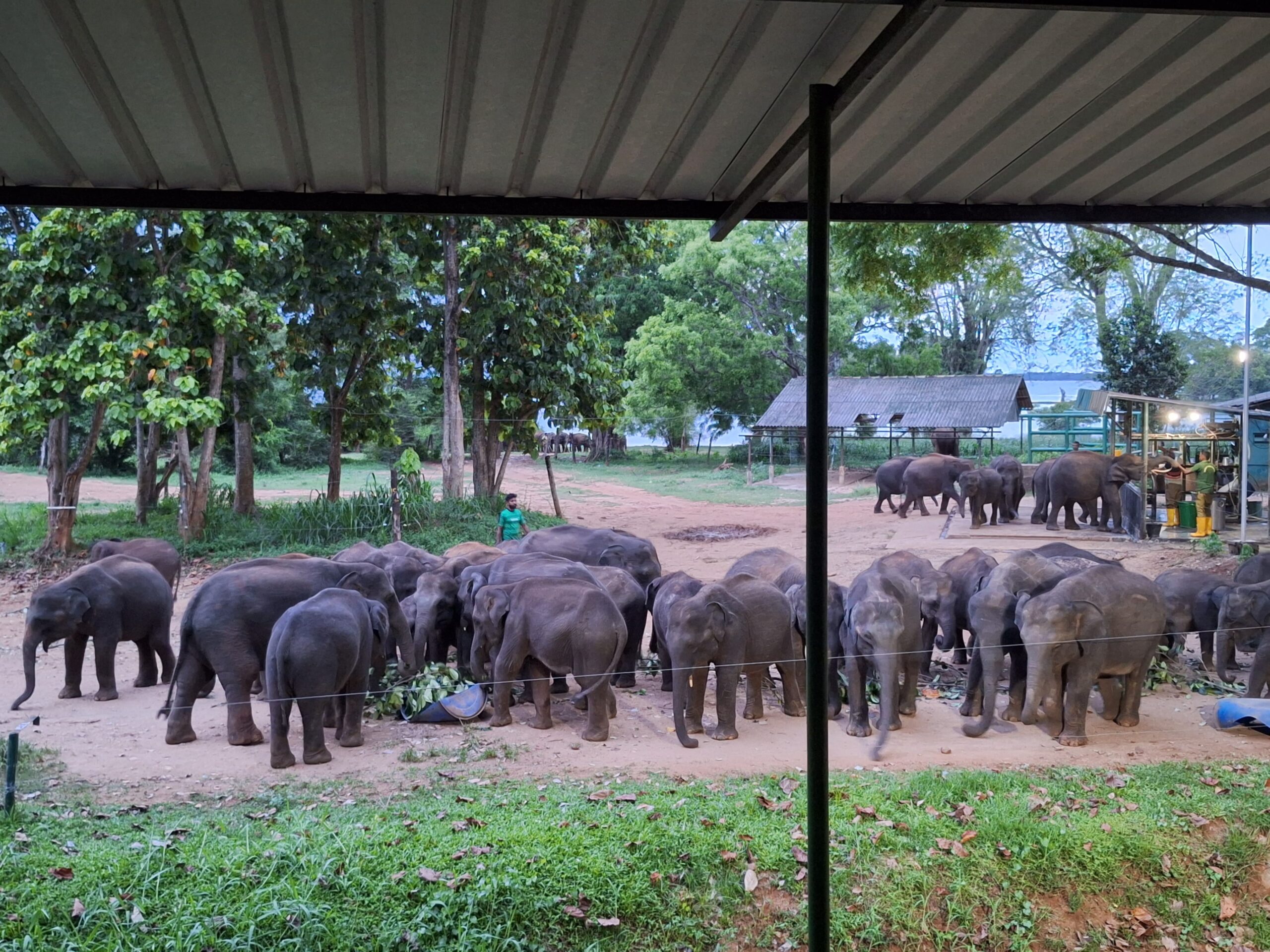Udawalawe Elephant Transit Home: A Sanctuary for Sri Lanka’s Orphaned Elephants
Nestled near the borders of the renowned Udawalawe National Park in Sri Lanka, the Udawalawe Elephant Transit Home (ETH) is a beacon of hope for orphaned and injured elephant calves. Unlike a traditional elephant orphanage, the transit home is designed to rehabilitate these young elephants with the goal of releasing them back into the wild, where they can live independently and thrive.
In this blog, we’ll explore the mission of the Udawalawe Elephant Transit Home, how it operates, and why a visit to this unique sanctuary is both heartwarming and essential for anyone visiting Sri Lanka.
What is the Udawalawe Elephant Transit Home?
Founded in 1995 by the Sri Lanka Department of Wildlife Conservation, the Elephant Transit Home was created to care for orphaned elephants found throughout the island. Sri Lanka is home to a significant population of Asian elephants, but habitat loss, human-elephant conflict, and poaching have left many calves without their mothers. ETH takes these young elephants in, rehabilitates them, and prepares them for eventual release into their natural habitat.
One of the unique aspects of this center is its emphasis on minimizing human interaction, ensuring that these elephants maintain their wild instincts. The ultimate goal is for these elephants to return to the wild, where they can integrate into wild herds.
A Day at the Udawalawe Elephant Transit Home
For visitors, a trip to the Elephant Transit Home offers a rare opportunity to observe these young elephants during feeding times. However, it’s important to note that unlike other elephant centers, the ETH doesn’t offer hands-on experiences. Instead, visitors can watch from a designated viewing platform as caretakers bottle-feed the calves. This hands-off approach ensures that the elephants do not become too reliant on humans, helping them to retain the necessary survival skills for their return to the wild.
Feeding Times
The best time to visit is during the scheduled feeding times, which occur four times daily—typically around 9 a.m., 12 noon, 3 p.m., and 6 p.m. During these feedings, the calves are brought to a secure area where they are given milk, which is specially prepared to meet their nutritional needs. It’s a joyous sight to see the young elephants playfully interacting with one another as they drink, and visitors often leave with a newfound appreciation for the care these majestic animals require.
The Process of Rehabilitation
Rehabilitating an orphaned elephant is no easy task. Young elephants rely on their mothers not only for nourishment but also for social learning and survival skills. Without intervention, orphaned elephants in the wild would likely die from starvation or be unable to fend for themselves.
The transit home takes in calves as young as a few months old, and their stay lasts several years, depending on their health and development. During their time at the ETH, the calves are gradually weaned off bottle-feeding, introduced to natural food sources, and encouraged to socialize with other elephants in a semi-wild environment. This training prepares them for the day when they will be released into Udawalawe National Park or other protected areas.
The transition from ETH to the wild is carefully monitored. Once the calves are old enough, they are fitted with GPS collars, allowing the ETH team to track their progress after release and ensure they are adapting well to life in the wild. The success of this program is evident, with many elephants having successfully reintegrated into wild herds.
Conservation and Education
Beyond its work with the elephants, the Udawalawe Elephant Transit Home also plays a key role in raising awareness about elephant conservation. Sri Lanka faces a growing problem of human-elephant conflict, where elephants come into conflict with farmers and communities as they encroach on agricultural land. By supporting the ETH and educating the public about the importance of preserving elephant habitats, the program hopes to reduce these conflicts and promote harmonious coexistence.
Visitors to the transit home have the opportunity to learn about these issues and contribute to the cause through donations or purchasing merchandise that supports the care of the elephants.
How You Can Help
There are several ways that visitors and elephant lovers worldwide can support the Elephant Transit Home:
-
Adopt an Elephant: The transit home offers an adoption program where you can contribute to the care and rehabilitation of a specific elephant calf. Your donation helps cover the cost of food, medical care, and rehabilitation efforts.
-
Donate: Every donation counts. Funds go directly to supporting the elephants’ care, and larger donations may help provide medical supplies, infrastructure improvements, and the release monitoring program.
-
Spread Awareness: One of the most powerful things you can do is raise awareness about the vital work being done at the Elephant Transit Home. Whether through social media, conversations, or travel blogs, sharing the ETH’s mission helps generate support for elephant conservation.
Plan Your Visit
Located just a short distance from Udawalawe National Park, the Elephant Transit Home is easy to include in a day trip or as part of a larger Sri Lankan wildlife adventure. Many safari operators in Udawalawe include a visit to the transit home as part of their packages, giving visitors a well-rounded experience of the region’s wildlife.
- Opening Hours: The center is open to visitors year-round, with feeding times occurring four times daily.
- Entrance Fees: A small entrance fee is required, and this money goes directly toward the care of the elephants.
- Best Time to Visit: For the best experience, plan to visit during the morning or afternoon feeding times to see the elephants up close.
Conclusion
The Udawalawe Elephant Transit Home stands as a testament to Sri Lanka’s commitment to wildlife conservation. Not only does it provide a safe space for orphaned elephants, but it also plays a critical role in the future of the country’s wild elephant populations. By supporting the ETH, whether through donations or simply visiting during your travels, you become part of a larger effort to protect these incredible creatures.
So, if you’re planning a trip to Sri Lanka and are passionate about wildlife conservation, don’t miss the chance to visit the Udawalawe Elephant Transit Home—an experience that will leave you both inspired and informed about the challenges facing one of the world’s most iconic species.




One Comment